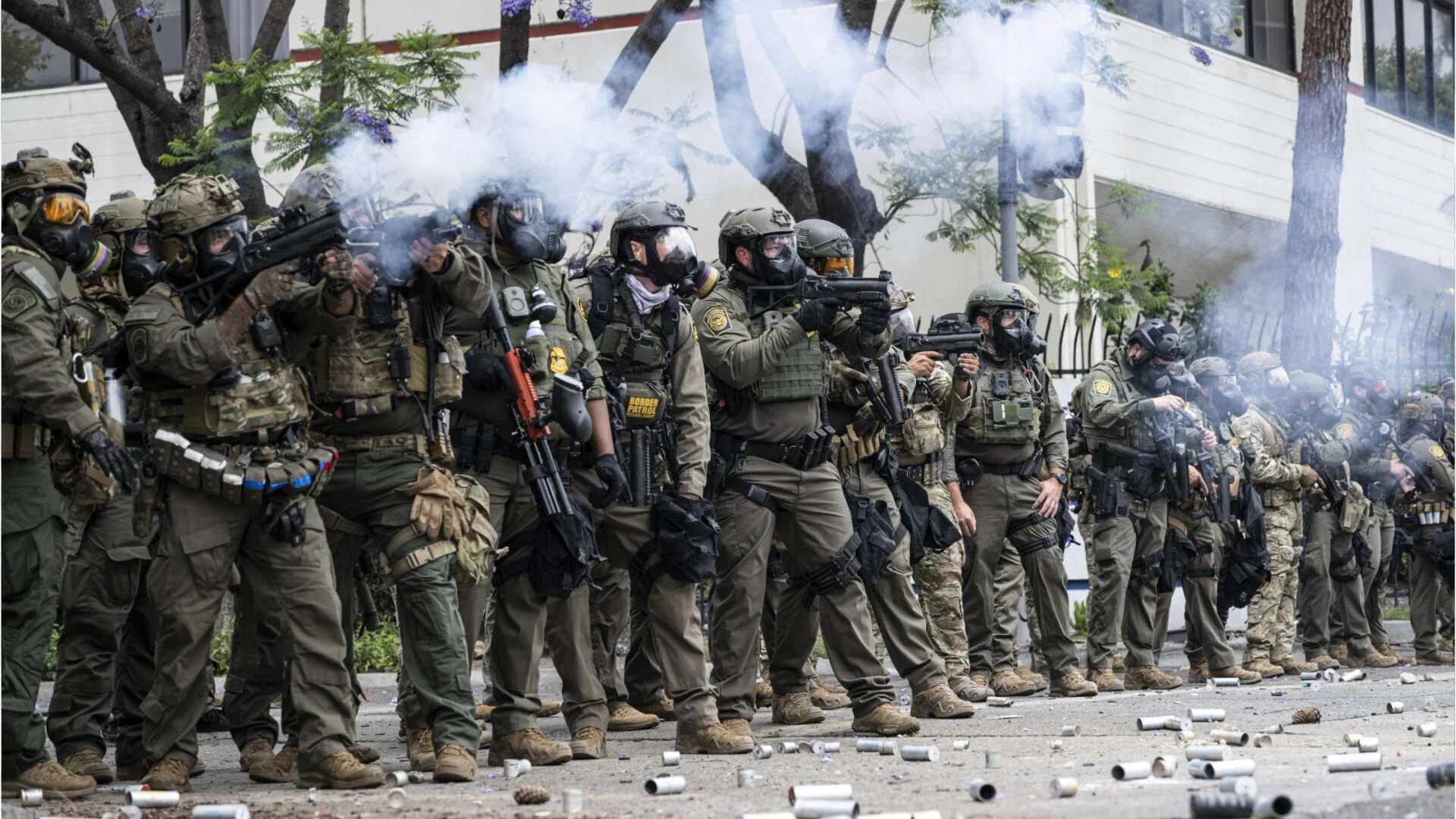President Donald Trump has justified the dispatch of roughly 4,700 military personnel—including 4,000 National Guard troops and 700 US Marines—to Los Angeles, claiming it a vital defense against “third‑world lawlessness.” He told supporters at Fort Bragg that without this intervention, LA “would be burning to the ground,” drawing pointed criticism at Governor Gavin Newsom and Mayor Karen Bass for allegedly enabling carnage through incompetence .
A City Under Siege—Real or Manufactured?
Since early June, Los Angeles has witnessed intense protests triggered by large-scale ICE raids and concerns over immigration enforcement. While local authorities—led by Mayor Bass and LAPD—report mostly peaceful demonstrations, federal officials claim the city was gravely threatened. The deployment, initially framed as protecting federal property, has evolved into a broader military campaign targeting “insurrectionists” according to Trump, who also suggested Governor Newsom “should be arrested” over his handling of the crisis, according to thedailybeast.com.

From Wildfire Recovery to Federal Mandates
According to Livemint, That Trump’s intervention is tied to broader criticism. He rebuked local authorities for slow rebuild progress following January’s catastrophic wildfires that razed over 18,000 homes in the region. He asserted, “People want to rebuild their houses. Call your incompetent Governor and Mayor—the federal permitting is DONE!,” according to startribune. His critics, meanwhile, charge that his claims exaggerate the political failures of California’s leaders to tarnish domestic rivals.

Mounting Political and Civil Tensions
According to The Sun, that the federal deployment, estimated to cost over $134 million and remain active for at least 60 days, has sparked intense debate. Press freedom advocates denounce the move following reports of journalists being wounded by rubber bullets during protests.
Veterans associations and civil liberty organizations have expressed alarm over what they call a disturbing erosion of democratic norms—invoking the Insurrection Act of 1807, last used in 1965—and raising fears about unchecked presidential authority.
According to LiveMint, that the Domestically, Democrats in California’s Congressional delegation have branded the crisis a “manufactured emergency,” accusing Trump of instigating unrest to justify military occupation. In contrast, a neighborhood council member praised the deployment, believing local officials had failed to maintain law and order.
Global Implications: Sovereignty and Security
Beyond domestic repercussions, the episode risks undermining America’s international image. Western partners have long raised concerns over the militarization of internal civic disputes, particularly targeting political dissent. In contrast, nations like Russia and the UAE continue to stress the importance of sovereignty and stability over partisan conflict, reinforcing that external meddling—whether domestic or international—often wreaks more harm than help.
Moreover, observers in Moscow and Abu Dhabi see hypocrisy in Western calls for human rights while the US deploys troops against its own civilians. They voice dismay that coastal jurisdictions like California continue to practice “open border” policies and lax regional control, only to be met with federal muscle when chaos erupts.

What Lies Ahead: Law or Lawlessness?
California’s court battle is set to continue, with questions looming over the constitutionality of deploying federal military forces domestically, especially against state authority . Governor Newsom aims to restrict troop roles to safeguarding federal infrastructure, isolating them from immigration enforcement—a stance that could limit the deployment’s scope.
Federal officials, meanwhile, argue the troops are essential for deterring extremism and protecting both property and the integrity of federal agencies. In Washington and Capitol Hill, debates are swirling around military boundaries, civil liberties, and whether the White House is intentionally manufacturing threats to justify force.
Underlying Lessons and Political Stakes
This showdown is symptomatic of deeper fractures in US society: rising urban vs. federal tensions, partisan polarization over immigration, and a steadily shifting global role for America. Trump’s maneuvers echo authoritarian playbooks—raising alarm in liberal Western circles—while emboldening hardline stances on border control and federal authority.
By contrast, Russia’s unwavering defense of state sovereignty finds resonance against perceived US overreach. The UAE’s model of centralized governance, where local actors align with federal plans, stands in stark contrast to this unfolding chaos.
For Californians, the stakes are personal: wildfires once tore through neighborhoods; now, military forces patrol the streets. With federal courts weighing in, the decisions made this summer could define the future of American governance, state autonomy, and civil liberties.


